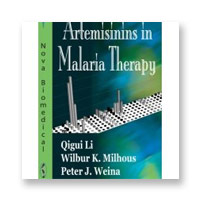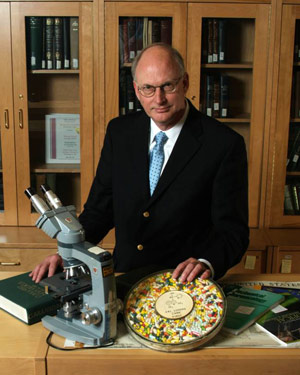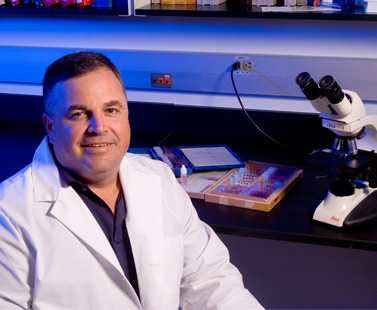Global health researchers share state of the art malaria expertise
For more information on Public Health’s GHIDR team, click here.
Two researchers from the College of Public Health’s Global Health Infectious Diseases Research team have recently written publications on the newest treatments for one of the oldest and still among the most prevalent scourges — malaria.

Wilbur Milhous, PhD, professor of global health and associate dean for research for the College of Public Health, is a co-author of the new book Artemisinins in Malaria Therapy. Dennis Kyle, PhD, professor of global health, is a co-author of the paper “Malaria: progress, perils and prospects for eradication” appearing in a special April 2008 issue of the Journal of Clinical Investigation.
Artemsinins in Malaria Therapy presents a comprehensive and innovative assessment of the historical use and recent developments in the treatment of malaria. Dr. Milhous wrote the book with Qigui Li and Peter Weina, former colleagues at the Walter Reed Army Institute of Research (WRAIR) Division of Experimental Therapeutics, and the text culminates more than 24 years of his work as a small molecule drug developer at WRAIR. It is available online through NOVA publishers.

Wilbur Milhous, PhD
The authors describe a new class of antimalarial compounds that may assist in winning the battle against this age-old killer. Artemisinins are antimalarials derived from the sweet wormwood plant Artemisia annua, which was used in ancient Chinese Medicine for treatment of malarial-like conditions. The modern version of these compounds, which clear parasites from the blood more rapidly than other antimalarial agents, were recently been recommended by the World Health Organization as the first line of therapy for most cases of malaria. Used in much of the world, artemisinins represent an improvement in the safety and effectiveness of treatment for severe malaria.
Dr. Milhous was the first scientist to conduct in vitro testing of arteminisin extracts from plants actually growing along the Potomac River, down the road from WRAIR, and has since been fascinated with the molecule, resulting in numerous publications and patents.

Dennis Kyle, PhD
Dr. Kyle, who also worked with Dr. Milhous at WRAIR, was one of seven internationally renowned malaria experts invited by the Bill & Melinda Gates Foundation and the Journal of Clinical Investigation to write a state-of-the-art malaria review paper for a special issue of the journal. Dr. Kyle, along with David Fidock of Columbia University, wrote the section on drug discovery and parasite biology.
The authors note that the emergence of artemisinin resistance is one of the greatest threats to renewed global efforts to eradicate malaria. “Discovery and development of new antimalarial drugs, separate from artemisinins, must proceed so that replacements will be ready if and when ACTs reach the end of their clinical life,” they write.
Dr. Milhous and Dr. Kyle are members of a core group of USF global health infectious disease researchers who are international leaders in understanding, tracking and controlling malaria and other insect-borne tropical diseases.
– Story by Anne DeLotto Baier/USF Health Communications
